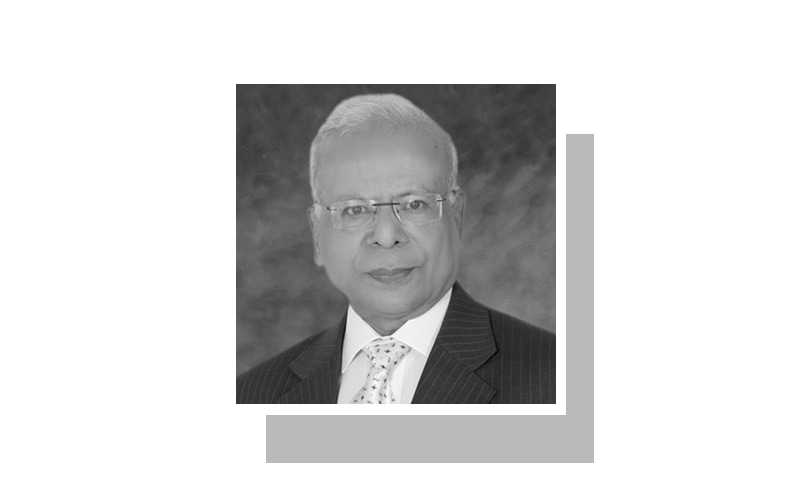The apex committees consisting of civil and military leadership represent an innovative model of governance to suit the country’s peculiar needs. This exceptional arrangement has been made because of pervasive weaknesses in the institutions of the rule of law and accountability. Criminals act with impunity because they believe they will be protected by their patrons in influential positions. It is not surprising, therefore, that the public has so heartily welcomed the recent crackdown against terrorists and corrupt elements.
It may be recalled that such action was also taken by Ayub Khan, Yahya Khan and Zulfiqar Bhutto; by the army in the 1990s; and NAB in the early 2000s. However, such highly visible but ad hoc actions make a temporary difference; they do not leave any lasting imprint. What is required is broad-based institutional reform. That, however, is a long, arduous process. Instead, a more selective approach can be adopted in which some key institutions that can act as restraints on maladministration of justice and rule of law, mis-governance and abuse of excessive discretionary powers could be strengthened in the next three to four years. This would have spillover effects on other institutions too.
Among these key institutions, the lower judiciary is more important than any other as it underpins the entire system of accountability and rule of law. In addition, there are at least 10 other institutions where reform that can make an overall difference.
Reforms in some key institutions can fairly rapidly bring about long-term improvement in the rule of law.
Federal Investigation Agency and provincial police departments: The performance of these institutions has deteriorated significantly because of politicisation of the process of selection, postings, transfers and promotions. To enhance their professionalism, they must be provided competent human resources, and adequate financial resources for training, equipment, mobility, accommodation, and welfare with accountability. The police force should be governed under its own law and rules rather than being subjected to the Civil Servants Act 1973.
Prosecution departments: The attorney general’s office and the prosecution departments do not attract high-calibre manpower because of lack of clarity about career progression and relatively poor compensation. The monetary losses incurred by the government due to weak prosecution and a subsequently high rate of acquittals of known criminals far outweigh the increased expenditure on a well-established and competent prosecution department.
Auditor general of Pakistan: The AG’s office has not fully utilised its constitutional powers to unearth and detect financial bungling rampant in the public sector. The slow pace at which financial irregularities are detected and the lack of professional expertise among core staff has diminished the efficacy of this office. Its shortcomings could be addressed by converting it into a supreme audit institution with autonomy, resources and accountability to parliament.
State Bank of Pakistan: As the regulator and supervisor of banks, the State Bank can safeguard against possible malpractices in the award of credit and recovery of loans. The banking sector in Pakistan, after last decade’s reforms, has emerged as quite strong but financial access remains limited and has to be extended to the middle and lower income groups to generate employment and reduce poverty and inequalities — the root cause of crime and terrorism.
Securities and Exchange Commission of Pakistan: Capital markets in Pakistan are highly shallow and have not played an effective role in the intermediation that is required in an emerging market. Corporate governance of publicly listed companies is weak and dominated by major family shareholders without due regard to the rights of minority shareholders. Insider trading is perceived to be widely rampant while disclosure of information standards is loosely enforced. The SECP needs operational autonomy, resources and skills to carry out its mandate.
Federal/provincial public service commissions: It is clear that the merit-based system of recruitment, appointments and promotions had served the nation far better than the present sifarish-based and ‘buy-the-post’ system. The responsibility for all recruitment and promotions should revert to the commissions without any exception, with individuals of proven integrity and impeccable credentials appointed as chairpersons and members.
Federal and provincial boards of revenues. Leakages of revenues due to connivance between tax officials and unscrupulous taxpayers are causing serious damage to the economy and need to be plugged by restructuring the federal and provincial revenue boards. The registrar’s offices under the boards of revenue have become dens of corruption and need to be cleaned up.
Federal/provincial ombudsman: These offices can become effective instruments for quick, fair and judicious redressal of citizens’ grievances against the arbitrary harassment by overzealous or corrupt officials. A proactive awareness-raising role, a demonstration of the extent of its reach and the selection of the right people to the posts can make it work.
Election Commission of Pakistan: After proper scrutiny and investigation, a powerful, independent and assertive ECP can disqualify individuals of ill-repute and dubious character, thereby enforcing the constitutional criteria for electoral candidates. This fundamental shift in the quality of our elected public officials would bring about a significant change in the overall structure of governance in the country.
National Accountability Bureau/ Provincial anti-corruption bureaus: The law under which NAB works, though effective, has been implemented selectively. The body should be given complete operational and financial autonomy and protected from political interference. Provincial anti-corruption bureaus must be given the same legal authority and powers as NAB.
The approach advocated here is to create an environment whereby acts of malfeasance are exposed routinely; vigilance and scrutiny is exercised continuously; investigation and fixing of responsibility is carried out resolutely and disciplinary action against those found guilty is taken promptly. This would be a more effective deterrent in curbing crime and corrupt practices than would enacting more laws and setting up agencies.
The reform of these institutions can make a difference, provided (a) they are headed by widely respected and competent managers of known integrity (b) the terms of reference, responsibilities, functions and powers of these institutions are clearly defined (c) there is no political interference in their working but at the same time they are held publicly accountable for their actions and the results (d) they are provided adequate financial resources and professional, high-calibre staff and (e) they follow transparent procedures and processes. To ensure non-partisan political support for these institutions their heads should be confirmed by parliamentary committees. This way, changes in political regimes would not disrupt their smooth functioning.
The writer is dean and director at the Institute of Business Administration, Karachi.
Published in Dawn, October 5th, 2015
On a mobile phone? Get the Dawn Mobile App: Apple Store | Google Play
































